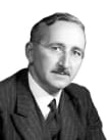Fritz Machlup (1902 - 1983)

Information is acquired by being told, whereas knowledge can be acquired by thinking
Fritz Machlup, an important member of the 4th generation of the Austrian School Economics covered almost all areas of economics. His most influential contributions, however are in the areas of international monetary- and financial policy, of methodology and of the information industry. Machlup’s famous Führer durch die Krisenpolitik (1934) (still in print!) is particularly relevant today in view of the failure of the interventionist welfare state and the growing masses of deprived and disenchanted citizens. Though published in the 1920s and 1930s, his work on the theory of international trade and monetary policy, are still valid today. His comprehensive, multi-volume work The Production and Distribution of Knowledge in the United States (1962), his book International Trade and the National Income Multiplier (1943) and his essay “The Theory of Foreign Exchanges” (1939/40) are considered classics.
I
Fritz Machlup was born on December 15, 1902 in Wiener Neustadt into an entrepreneurial family. With a thriving cardboard factory in both Austria and Hungary, Machlup initially thought of a business career alongside and later also after his studies at the University of Vienna. Stimulated above all by his teacher Ludwig von Mises and also strongly influenced by his friends, the social philosophers Felix Kaufmann and Alfred Schütz, he developed an increasing interest in theoretical economics and the methodology of the social sciences.
With his only slightly older fellow students Gottfried von Haberler, F.A. Hayek, Oskar Morgenstern, and Paul N. Rosenstein-Rodan, he soon formed the inner core of the 4th generation of the Austrian School of Economics, which matured in Ludwig von Mises’ private seminar outside of the university. But Machlup also belonged to the circle that Friedrich A. von Hayek and Herbert von Fürth had founded during the fall semester of 1921. In this “Geist Kreis” (Martha St. Browne) young social scientists met once or twice a month to discuss the basic problems of the social sciences. Since Machlup was the only one of this group who wrote his dissertation under Mises’ supervision, he was Mises’ last direct student in Austria.
II
Although several of Machlup’s works, such as Die Goldkernwährung (1925), Die neuen Währungen in Europa (1927), or “Currency and Foreign Debt: Remarks on the Discussion Between Schacht and His Critics” (1928) received considerable attention, his appointment to the University of Vienna regretfully was thwarted. The growing antisemitism, the lack of any prospects for an academic career and in anticipation of a radical political change, Machlup took a leave of absence from his company and accepted a modest Rockefeller Fellowship for further studies at various universities in the USA. During his studies he made contact with leading economists such as Frank Taussig, Frank Knight, his fellow Austrian Joseph A. Schumpeter and also befriended students like Milton Friedman or George Stigler. At the beginning of 1934, due to the increasingly threatening news from Europe, Machlup returned briefly to Austria and not only sold his company with great success. He also published his last German book, Führer durch die Krisenpolitik (1934). In view of the failure of the interventionist welfare state, out of control public expenditures and the growing masses of deprived and disenchanted citizens, this book is particularly relevant today and still in print.
After about a year at the London School of Economics, where he reunited with his friends F.A. von Hayek and Rosenstein-Rodan, he accepted the Goodyear Foundation Professorship at the State University of New York at Buffalo in February 1936. After acquiring US citizenship and during WWII Machlup worked first at the Brookings Institution on problems related to the international patent system and then from 1943-1946 at the Office of the Alien Property Custodian in Washington.
In 1947 Machlup was appointed Hutzler Professor of Political Economy at the Johns Hopkins University in Baltimore and taught there for the next 13 years. Among the numerous and important works he published while at Johns Hopkins, the most influential was certainly his book The Basing-Point System: An Economic Analysis of a Controversial Pricing Practice (1949). This work prompted President Truman to overturn the proposed legislation to make the price law uniform. Machlup’s study of The Political Economy of Monopoly: Business, Labor, and Government Policies (1952), also had a great influence on the American economic policy of the 1950s.
III
Always looking for new challenges, in 1960 Machlup took the position of Walker Professor of Economics and International Finance at Princeton and founded there the “International Finance Section” which soon started to publish the important “Special Papers in International Finance”.
When US Treasury Secretary Douglas Dillon announced a complete overhaul of international monetary policy in 1963 and suggested that proven scientists should not be heard, Machlup reacted in return with the so-called “Bellagio Group”. This group of professors met in Bellagio (Italy) and exerted a far-reaching influence in the early 1960’s. The result of these intensive deliberations, which he published as International Monetary Arrangements: The Problem of Choice (1964), was so significant that politicians and central bank governors asked him to be present at the deliberations of the “Bellagio Group”. This made him socially acceptable again in Europe and in 1967 he was offered the presidency of the Austrian National Bank for the first time and in 1972 a second attempt was made. Machlup declined both offers. His two essays, “My early work on international monetary problems” (1980) and “My Work on International Monetary Problems, 1940-1964” (1982) are particularly instructive for the development of his monetary and fiscal policy ideas.
Although, Machlup’s interest in information industry issues dates back to the 1940s, his classic An Economic Review of the Patent System (together with Edith Penrose) was published only in 1958. A few years later he followed up with an essay on “The Supply of Inventors and Inventions”, in which he developed his original theory. Machlup explains how innovative inventions come about and also describes the time frame within which their first imitations occur. This work led him to his comprehensive, multi-volume work The Production and Distribution of Knowledge in the United States (1962). As if to excuse the extent of his extensive research, which he planned to publish in 10 volumes, he wrote in the preface to the first that a single book could hardly do justice to the ever accelerating “knowledge explosion”. The first volume, Knowledge and Knowledge Production, appeared only in 1980, the second, The Branches of Knowledge, followed in 1982. And the third volume, The Economics of Information and Human Capital, was published posthumously in 1984. Although not completed, this great work is considered groundbreaking and fundamental.
IV
Shortly before his retirement, Machlup was on the move again and accepted a professorship at New York University where he continued the tradition of “Austrian Economics”, established by his teacher Ludwig von Mises. It was in this function towards the end of his life that Machlup exerted the greatest influence, because he was instrumental in setting up the “Program in Austrian Economics”. In his famous lectures at NYU, often with standing room only Machlup focused mostly on methodology. For him, methodology is neither a means for finding the best possible approach to research tasks, nor is it a report of good or bad tools, or a description of the research paths taken. Rather, methodology is a logical principle within the sciences by which we can either accept as valid or reject a proposition. Thus Machlup distinguishes between two different types of statements: “statements of pure economic theory”, which only assume the most general types of human action, and “statements of different order”, which are only data of economic relevance. It is therefore not the task of methodology to dictate to the researcher what should be included in a paper. It is surprising that Machlup, as a worldwide accepted expert on monetary issues and celebrated academic teacher, hardly ever managed to attract many direct students. Most of his methodological work is contained in his collection Essays on Economic Semantics (1972) and in his book Methodology of Economics and other Social Sciences (1978).
Fritz Machlup’s great work covers almost all areas of economics. His most influential contributions, however, are in the areas of international monetary- and financial policy, the methodology of the social sciences, and problems of the information industry. His first contributions to monetary policy, published in the 1920s and 1930s, were building blocks for some of his most important work on the theory of international trade and financial policy. His essay “Theory of Foreign Exchanges” (1939/40), with which he further developed Gottfried von Haberler’s concept of the demand function of exchange rates, became a classic. His book International Trade and the National Income Multiplier (1943) became particularly important in addressing the implicit assumptions underlying John Maynard Keynes’ theories.
In addition to his overwhelming list of publications, diverse research programs, and international teaching engagements, Machlup has chaired the most important international associations. He was President of the Southern Economic Association in 1959, President of the American Economic Association in 1966, and President of the International Economic Association from 1971 to 1974. In 1947, together with Hayek, Mises, Friedman and around 30 other great liberals, he founded the Mont Pelerin Society, an international association of liberal social scientists. His many awards, honorary doctorates and awards are legion. Fritz Machlup was not only one of the most influential theorists of our time, he was also a recognized expert in the music of Mahler and Wagner, and one of the most cultivated, tolerant and understanding person one could ever meet. Fritz Machlup died in Princeton on January 30, 1983.
The sheer unbelievable pace at which Fritz Machlup lived and worked, the way and sharpness with which he thought and wrote, is probably best described in Kenneth Boulding’s short rhyme (1970):
“Oh, happy is the man who sits
beside or at the feet of Fritz
whose thoughts, as charming as profound
travel beyond the speed of sound.
All passing as he speeds them up,
Mach 1, Mach 2, Mach 3, Machlup.
With what astonishment one sees
a supersonic Viennese
whose wit and vigor, it appears
are undiminished by the years.”*
Kurt R. Leube
*K. Boulding crafted this ryhme and introduced Fritz Machlup at a reception in his honor at the University of Colorado in 1970.





































